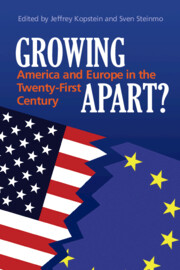Book contents
- Frontmatter
- Contents
- Contributors
- Acknowledgments
- Growing Apart?
- Introduction: Growing Apart? America and Europe in the Twenty-First Century
- 1 The Religious Divide: Why Religion Seems to Be Thriving in the United States and Waning in Europe
- 2 Value Change in Europe and North America: Convergence or Something Else?
- 3 On Different Planets: News Media in the United States and Europe
- 4 One Ring to Bind Them All: American Power and Neoliberal Capitalism
- 5 Spreading the Word: The Diffusion of American Conservatism in Europe and Beyond
- 6 Work, Welfare, and Wanderlust: Immigration and Integration in Europe and North America
- 7 Lost in Translation: The Transatlantic Divide over Diplomacy
- 8 The Atlantic Divide in Historical Perspective: A View from Europe
- Index
4 - One Ring to Bind Them All: American Power and Neoliberal Capitalism
Published online by Cambridge University Press: 19 January 2010
- Frontmatter
- Contents
- Contributors
- Acknowledgments
- Growing Apart?
- Introduction: Growing Apart? America and Europe in the Twenty-First Century
- 1 The Religious Divide: Why Religion Seems to Be Thriving in the United States and Waning in Europe
- 2 Value Change in Europe and North America: Convergence or Something Else?
- 3 On Different Planets: News Media in the United States and Europe
- 4 One Ring to Bind Them All: American Power and Neoliberal Capitalism
- 5 Spreading the Word: The Diffusion of American Conservatism in Europe and Beyond
- 6 Work, Welfare, and Wanderlust: Immigration and Integration in Europe and North America
- 7 Lost in Translation: The Transatlantic Divide over Diplomacy
- 8 The Atlantic Divide in Historical Perspective: A View from Europe
- Index
Summary
In 2007, the United States government will spend more on its armed forces than all other countries combined. This fact, plus U.S. operations in Afghanistan and Iraq, tensions with Iran, and the “war on terror,” all make it easy to forget that American power is not based solely on its military might. At a time when pundits and policy makers alike speak of the “unipolar moment” or a new age of “empire,” it should make us pause to consider what such power is also based upon.
Unlike the dark lord Sauron of The Lord of the Rings, the United States does not rule the world through the cruelty of a great army of Orcs. Like most successful great powers, military power is only part of the story. But like the dark lord Sauron, to stretch the analogy to its fullest, the power of the United States rests not merely on military might, but on “binding” men together with a conception of, if not what is “right,” then at least what is desirable. As the political scientist Joseph Nye argues, as well as applying force, a state can “obtain desired outcomes in world politics because other countries want to follow it, admiring its values, emulating its example, aspiring to its level of prosperity and openness.”
Consider, by way of contrast, the late Chairman Mao's statement that “power comes from the barrel of a gun.” This is undeniable.
- Type
- Chapter
- Information
- Growing Apart?America and Europe in the 21st Century, pp. 109 - 135Publisher: Cambridge University PressPrint publication year: 2007
- 5
- Cited by



